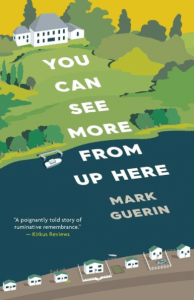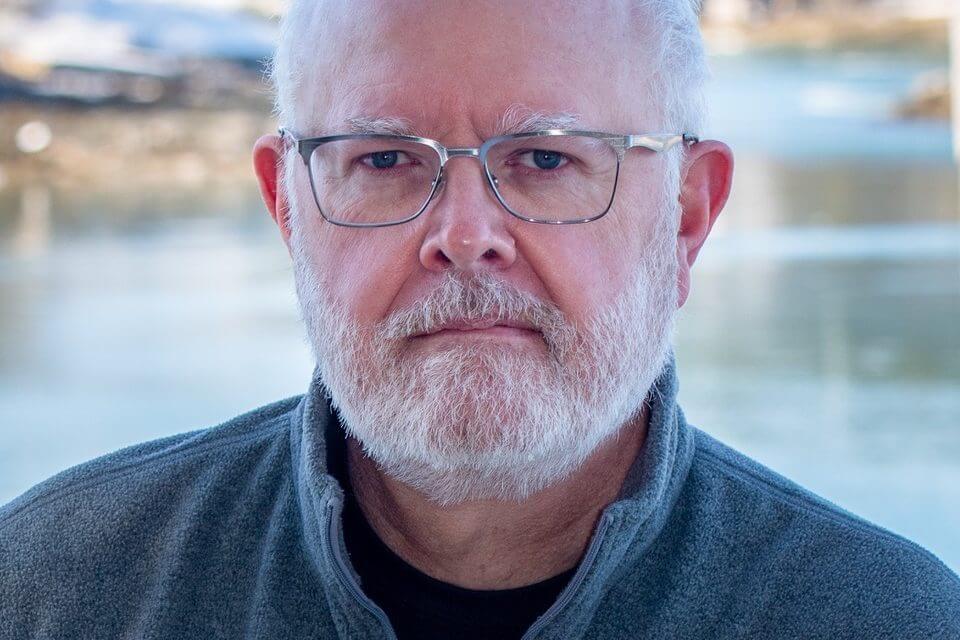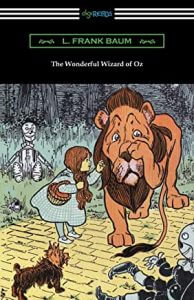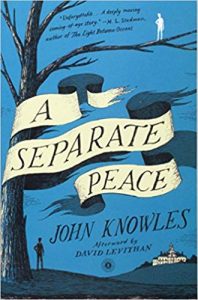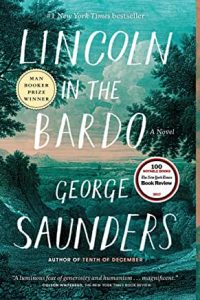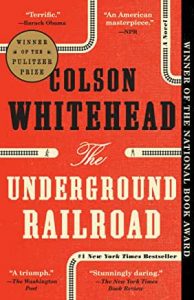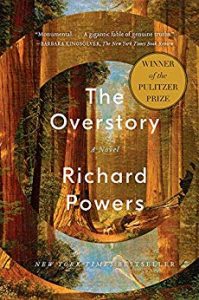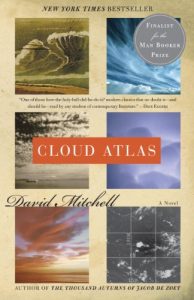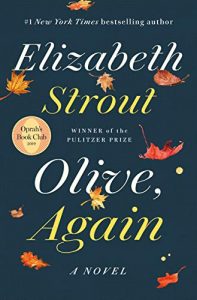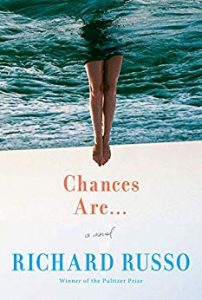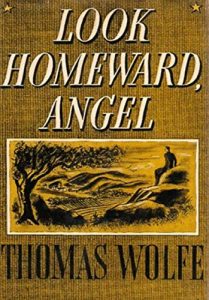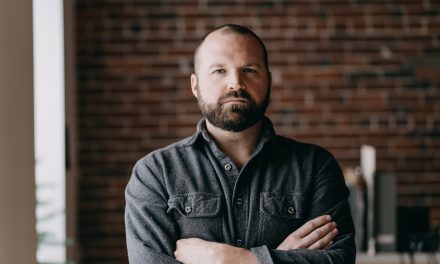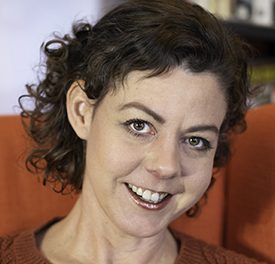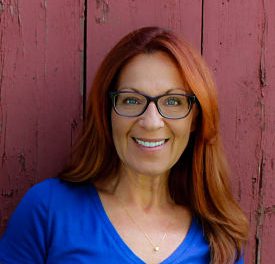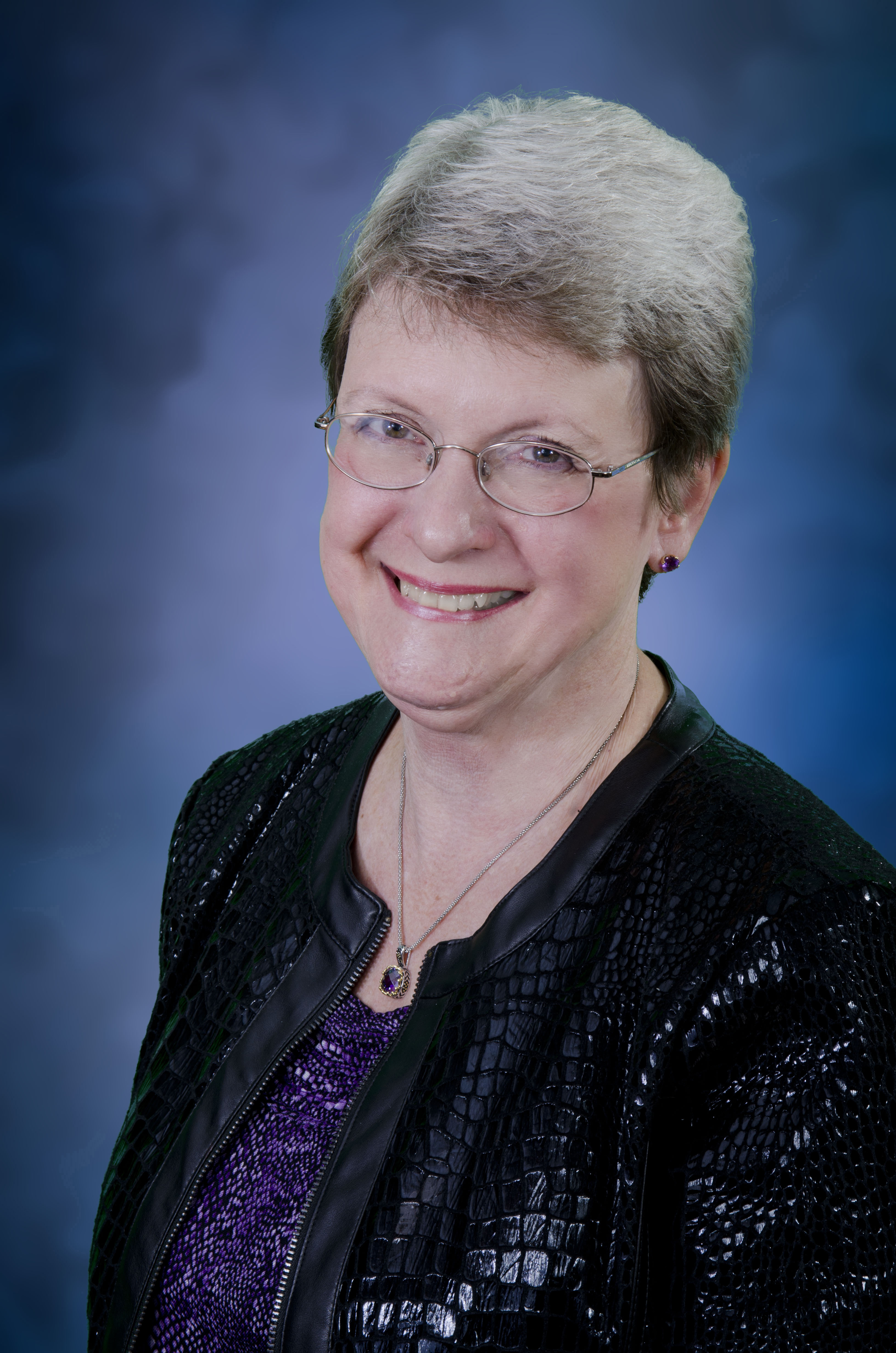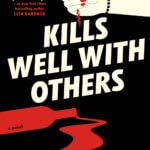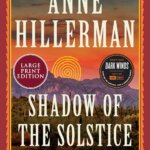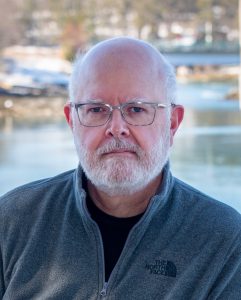
MG: I was an “Air Force Brat,” the son of an officer and doctor who was stationed around the world in various places as I grew up. We ended up in the Midwest where I went to Northern Illinois University, majoring in English and beginning my writing career as a poet and editor of the college literary magazine. After graduating, I was a journalist in Chicago and aspiring playwright for a few years before meeting my wife-to-be and moving to Massachusetts where I earned an MFA at Brandeis University for Dramatic Writing. For the next thirty-five years, my wife and I lived on the campus of a private school my wife worked at while we raised two children, and I held down various jobs as a business writer, graphic designer and trainer. In 2011, I retired from business writing to devote myself to fiction writing. In 2014 I graduated from the Novel Incubator program run by Grub Street in Boston, and in October, I published my first novel.
SS: I was an oil-field brat and lived in twenty-two towns by the time I was twenty-four months old. Now to move to writing. Have you always been driven to write? Or did you begin writing in response to a particular stimulus?
MG: I was always pretty shy growing up. Writing poetry and articles for the high school newspaper occupied me in a way that was absorbing and made me less conscious of how few friends I had. In college, my older brother was a writer and he encouraged me to join the staff of the literary magazine as a way to bring me out of my shell, I think. It worked. I loved talking about writing with the other students and ended up dating a woman who wrote poetry and worked with the magazine. That magazine became my social life throughout college, culminating in my becoming the editor for a couple of years. I wasn’t a bad poet, myself, winning a few awards and getting published in literary magazines.
SS: What’s the first book that made you cry? Made you angry? Made you rejoice?
MG: My mother used to read us the Oz books written by Frank L. Baum, and those were the first books that really brought home to me the power of the imagination to create vivid and amazing worlds and characters. But I think the first book that brought me close to tears was A Separate Peace, as I saw myself in the quiet, introverted character of Gene and felt so badly when his best friend (spoiler alert) died in the end.
SS: That was one of my favorite books I read in high school. Have you made any literary pilgrimages?
MG: In college, a group of us student writers went to Oxford, Mississippi, the hometown of William Faulker, visited his big, drafty old house, and touched his ancient typewriter. From that amazing setting, with all the Live Oaks and the Spanish Moss hanging everywhere, it was clear those novels could not have been written anywhere else. While there, I shook the hand of Eudora Welty upon receiving a prize for best undergraduate poem in the nation. It was all pretty cool for a young college kid.
SS: Writing is undoubtedly a lonely occupation. John Green (The Fault in Our Stars) says writing is a profession for introverts who want to tell you a story but don’t want to make eye contact while doing it. P. D. James (Cover Her Face) says it’s essential for writers to enjoy their own company. Do you see yourself along those lines? Are you a natural loner?
MG: Absolutely. As you may gather from my previous answers, I’m a poster boy for the introverted writer.
SS: I’m pretty introverted myself. Do you have a day job? If so, is it a distraction, or does it add another element to your writing?
MG: I could never write well when I had a day job. For years during my daily train commute into Boston, I worked on a novel that kept veering off in different directions (the novel, not the train) because I couldn’t maintain my focus on it, what with the pressures and distractions of work and raising a family. I left my job at the age of 56 to write full-time, and since then I’ve written three novels in seven years.
SS: We’re on about the same trajectory—I retired at 62 and am working on my fourth novel. How does your home and its environment influence your writing? To what extent?
MG: I’m retired and live in Maine on a peninsula that extends into the ocean, so it’s very quiet and conducive to writing. When I have a problem to work out, a plot point that needs fixing for instance, I take my two dogs for a walk in the woods behind the house. That’s a great way to change things up and think about things from a different perspective. But the fact is, I can write just about anywhere.
SS: If you have children, does being a parent influence your writing? To what extent?
MG: My daughter is also a writer, a public radio news reporter, who is currently working on a long-form investigative podcast series. She encounters long-form narrative writing problems similar to what I deal with as a novelist, so we often compare notes and share advice. It’s great to have that in common with her.
SS: Hilary Mantel (Wolf Hall) says that a Catholic upbringing is the only qualification a writer requires. Can you relate to this idea? Do you have any similar writing qualifications?
MG: If she’s referring to how catholicism engenders a sense of moral responsibility in the individual, I can relate to that, having been brought up Catholic. Although I’m no longer religious, that has stuck with me, and I do think it gives me as a writer a moral imperative to treat all my characters fairly and evenly.
SS: When I read other authors’ biographies, mine seems dull by comparison. How do you feel about your life story? Have you ever been tempted to jazz yours up?
MG: Between 1988 and 2011, I was just a ‘working stiff,’ raising a family with my wife, nothing too remarkable about it. I like to think that, now that my first book has been published, I am finally ‘jazzing’ up my story, moving it in a direction I always hoped it would go.
SS: How long have you considered yourself a writer? Did you have any formal training, or is it something you learned as you went?
MG: I’ve had plenty of formal training, including an MA in English and an MFA in Dramatic Writing. I also completed the year-long Novel Incubator program at Grub Street, which is basically an MFA in novel writing. I’ve always taken classes and sought out feedback, whether from real-world or online writing groups, to keep my writing real and readable. You can’t be a writer without considering your audience, and taking classes and completing programs is how you learn what an audience wants and expects. It’s also how you learn what you can do that’s original and unique to thwart those expectations in a way that piques your audience’s curiosity and makes you stand out as an original voice. Aside from training and feedback, the most important thing I did to develop myself as a writer was to read. I read in many different genres to get a sense of what’s possible and what readers want and what other directions I might like to take my writing.
SS: As I approached three critical milestones in a woman’s life (retirement, divorce, and an empty nest) I wanted to do something that would keep my mind active. I decided to write, and with that first novel, quickly learned how much I didn’t know. As a full-time physician working an erratic shift coupled with an even-more erratic call-schedule, I couldn’t guarantee that I could show up at a traditional class every Wednesday afternoon. So So I went on-line to look for writing schools and chose Stanford University’s online novel-writing program. I’m convince it saved me years of struggle, and I’m still in touch with my professors and writing colleagues. Mark, do you generally write in one genre? If so, what is it? And what can readers expect from one of your books?
MG: Most of what I’ve written has been what might be considered literary or contemporary fiction, although the book I’m currently working on is speculative, dystopian fiction set in a very realistic, contemporary setting. Because of my playwriting background, readers can expect to see a lot dramatic scenes in my books with lots of dialogue and character interaction. I prefer to show my characters in scene rather than telling my readers about them from a narrative distance.
SS: Regardless of genre, what are the elements that you think make a great novel? Do you consciously ensure all of these are in place?
MG: I love to read novels with a strong narrative arc, where we see characters’ lives evolve and change as a result of the actions they take. A great novel also needs to attend carefully to all its characters, making them feel real and rounded, even the antagonists–the ‘bad guys.’ I love how writers like Barbara Kingsolver, Ann Patchett, Celia Owens and Elizabeth Strout get into the heads of their characters and develop their arcs, and these are elements I strive for in my writing. That being said, I also love to read writers who experiment with point-of-view, language, structure and time, writers like Anthony Doerr (All the Light We Cannot See), George Saunders (Lincoln in the Bardo), Colson Whitehead (Underground Railroad), Richard Powers (The Overstory), David Mitchell (Cloud Atlas) and Ocean Vuong (On Earth We’re Briefly Gorgeous), or who play with extravagantly ‘out-there’ ideas, like the sci-fi writer Neal Stephenson.
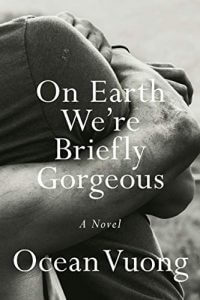
MG: Early in 2016, I was doing a lot of reading and research on the Berlin Wall in the 60s. I was thinking of setting a book in that time and place, but as we all know, ‘things happened’ late in 2016, and I began to wonder what would happen if a Berlin Wall-type situation were to occur in the United States. Specifically, what would happen if a wall were erected in New York City after the secession of the New England states from the USA? In my novel, based on actual stories of Berlin in the 60s, a wall goes up that separates two lovers, imprisoning one in the much-diminished, authoritarian United States and forcing the other to come up with a radical escape plan that involves tunneling under 57th Street in midtown Manhattan. It’s a very different book from this one, but I think it’s timely, too. My new book is tentatively called Escape From America.
SS: If you time-warped fifty years into the future and found that something you created has become a trope or buzzword, how would you feel? Would you feel cheated of royalties or vindicated as a genius?
MG: Vindicated!
SS: Do the parts of your story that move your readers most move you as well? Or does your special position as Creator give you a different ear for the highs and lows of the tale?
MG: My fictional story is based on my real-life relationship with my father which was very difficult, so I always find it moving to read those scenes where the son confronts the father, something I wish I could have done with my father.
SS: I had a difficult father as well and never really reconciled with him before he died. Some of the men in my books reflect him; others reflect what I wish he could have been. What is your writing Kryptonite? What’s most likely to stop the flow of your words?
MG: I can’t outline a book, knowing in advance where the story is going, without it killing the desire in me to write it.
SS: I’m the same way. The one book I carefully outlined I never did anything with because it “felt” already written by the time I was through. I did incorporate parts of it into Hunting the Devil, though. What is a fun or strange source of inspiration that ended up in your book (a name, location, line of dialogue, etc.)?
MG: How about a purple, 1960 Cadillac DeVille that my father inherited? That ended up playing a big part in my book and became a character in its own right.
SS: Oddly, I waited forty years to insert this vehicle into a book: in 1980s Santa Barbara, California, I saw a beat-up old truck driving down the road. Its bumper sticker read Frankentruck. It’s often believed that almost all writers have had their hearts broken at some point in time, does that hold true for you?
MG: Many times. My protagonist’s broken heart haunts him for years.
SS: What other authors are you friends with, and how do they help you become a better writer?
MG: I belong to a community of novelists who graduated from the Novel Incubator program in Boston, including Michelle Hoover, E.B. Moore, Kelly Ford, Emily Ross, Susan Bernhard, Louise Miller, Belle Brett and Rachel Barenbaum, among others. I’ve taken classes with (or from) all of these writers and one time or another, and they’ve always been supportive.
SS: How do you give back to the writing community?
MG: I volunteer two days a week for a non-profit group out of Portland Maine called The Telling Room that goes into schools and teaches young kids about writing stories. I hope to see some of these kids grow up to be writers some day.
SS: What would a fly on the wall see if he watched you while you are writing?
MG: Me, with a laptop in my lap, pounding away, scratching my head, pulling at my beard, then pounding away again.
SS: What works best for you: typewriters, computer, dictation, fountain pen, or longhand?
MG: My Macbook and Scrivener.
SS: Do you ever incorporate something that happened to you in real life into your novels?
MG: My novel is semi-biographical, based on my teenaged years living in a small factory town in northern Illinois. It’s about how my father, a former Air Force colonel, doctor and hospital commander ended up working at an automobile plant doing physicals and handling worker’s comp claims, and how his hatred of that job affected his family – and me, as his son. My novel starts with those facts and then speculates, in fiction, as to how this all came to be and how a father and son relationship in this situation might evolve. So, yes, my novel very heavily incorporates my real life into its fictional narrative.
SS: Do you hide any secrets in your books that only a few people will find?
MG: There are numerous anecdotes in my book only my siblings will recognize has being based on real incidents in our family’s life. The most egregious one: my mother always called the stick shift in the car ‘the pernundler,’ based on the letters for various transmission modes: P (for Park), N (for Neutral), D (for Drive) and R (for reverse). Readers will probably scratch their heads when they see that without the explanation.
SS: What part do your own fears play in your fiction?
MG: A huge part. Much of my book’s plot turns on how my protagonist’s fear of his father paralyzes him and makes him unable to act. My protagonist got that all from me.
SS: Do you think that self-revelation is part of the writing process?
MG: Yes.
SS: How do you create and construct distinctly individual supporting characters?
MG: I think it all starts with desire, with what a character wants out of life. Friends. Love. Money. Booze. Sex. Power. Fun. Stability. Family. After planting that seed, you see how the character grows based on the environment he’s in and the people that either feed into his desire or prevent him from attaining it.
SS: How do you make your readers regret they’re coming to the end?
MG: By leaving unanswered questions at the end. Will this character actually get back together with that character? Has this rift been resolved or not? Yes, you have to answer the big questions, but by leaving some questions unanswered, you leave the reader craving more.
SS: A good ending should fit the shape and meaning of the whole novel. How did you make sure yours did exactly that?
MG: My ending employs some objects that were symbolic throughout the book to help tie things up and, at my editor’s urging, I made sure my protagonist addressed the central question that had been plaguing him throughout the book.
SS: Which scene did you find the most challenging to write and why?
MG: The protagonist’s confrontations with his father and discussions with his friends about his father’s abuses were difficult to write because they were based on my memories of my father. Getting at those truths is tough to do without being overly sentimental or, conversely, failing to address the emotional heart of the matter. Being emotionally honest is never easy, especially when it is based on your own life.
SS: Lisa Cron (Wired for Story) says, “We think in story. It’s hardwired in our brain. It’s how we make strategic sense of the otherwise overwhelming world around us.” In what way are you trying to make sense of the world?
MG: I read and enjoyed Lisa’s book. I think it gets at the heart of why people read, which as I understand it, is to give shape to and make sense of the world’s chaos, the same way clocks and calendars make sense of time.
SS: In a recent interview, Richard Powers (The Echo Maker) said that he wants literature to be something other than it is today: “There was a time when our myths and legends and stories were about something greater than individual well-being. When the Cherokees lived here and told how the Smokies were formed, they said an enormous bird flapped its wings, and every time the wings touched the ground, they beat down a valley. We’ve just come so far down that path of thinking the use of a story is just for our private consumption, our private manufacture, the creation of internal meaning.” How do you react to that?
MG: I read and loved Power’s The Overstory, which made me think about trees and their importance to the world in just the way I think he hopes people might regard story: as something greater than individual well-being. That book is a real eye-opener to ideas and concepts I had never really thought about before, ideas that can shape the way we think about the world, and that’s the true power of a great book.
SS: Are you looking to entertain or illuminate?
MG: Both. Readers cannot be illuminated if they are not first entertained to some degree, and by that I mean intrigued, drawn in, made curious.
SS: Do you believe you write the kind of book you’d want to read?
MG: Definitely. I like page-turning stories that keep raising questions I want to see answered. Although good writing is essential, it’s not enough if it’s not telling a captivating story, too.
SS: Khaled Hosseini (The Kite Runner) feels he discovers a story rather than creates it. Are you a plotter? Or do let the novel develop organically?
MG: I agree with Khaled. I have many car metaphors in my book, and I use one for how I write. To me, writing is like driving at night with only a general idea of where you’re going, and you can only see as far down the road as your headlights will illuminate. As long as those lights keep discovering more road – more twists and turns and obstacles – I can keep writing. Only when the road disappears and I become totally lost do I resort to the ‘roadmap’ of an outline to get a better sense of the plot and get me back on track.
SS: Over time, what would you say has improved significantly in your writing?
MG: My story-telling. I have several plays and novels I never finished because I couldn’t figure out where to take my stories, how to keep them twisting and turning, how to end them. I conquered that problem in my two most recent books. Let’s hope I can keep solving that problem in my future books.
SS: How do you feel when you’ve finished writing a novel? Are there any particular characters that you have found it hard to let go of?
MG: I found it particularly hard to let go of the protagonist in You Can See More From Up Here as he was based on me but was actually able to tie up some loose ends I never could.
SS: According to F. Scott Fitzgerald (The Great Gatsby), a novel is never really finished but only abandoned. How does this apply to your own work?
MG: It always feels like I could do more — streamline this or clarify that, deepen this or cut that. Because the opportunities for editing are endless, how can you feel like you are ever done?
SS: What are you currently reading?
MG: I recently finished reading Chances Are by Richard Russo, a fellow Maine author. I discovered his book to be somewhat similar to mine, as it deals with men my age coming to grips with the disappearance of someone important to their lives back when they were in college. I’m currently reading Elizabeth Strout’s Olive, Again. It’s set in the fictional town of Crosby, Maine, which I know to be based on Brunswick, Maine, where Strout has a summer home. I live five miles from Brunswick, so it’s illuminating to see how she writes about rural Maine characters and communities in an area that I’m quite familiar with. Needless to say, she nails it.
SS: What books inspired you as a child? As an adult?
MG: Thomas Wolfe’s Look Homeward, Angel was a particular inspiration for this book because he wrote an unflinching novel about his real family. Reading that gave me the permission I needed to move forward with this semi-biographical novel about my family.
SS: Have any new writers grasped your interest recently?
MG: Ocean Vuong’s new book, On Earth We’re Briefly Gorgeous, is beautifully written and stylistically quite original.
SS: Do you read your book reviews? How do you deal with bad or good ones?
MG: So far, I’ve been lucky. A couple readers have complained about the length of my novel, which is understandable, but so far no one has outright panned my book. Like all new authors, I just wish I could get more reviews in mainstream pubs so that more people might read my book.
SS: How did publishing your first book change your process of writing?
MG: It’s been very hard for me to write something new and to promote this book at the same time. Perhaps, in a few weeks, when this all slows down a bit, I can get back to my writing.
SS: I’ve had the same problem. I tried to go NaNoWriMo to get back into the swing of serious writing, but doing NaNo the month of my son’s wedding was probably not wise. What was your first recognition/success as an author?
MG: I went out on a limb submitting the unpublished ms of my book to Kirkus Reviews for a review more than 18 months ago, but it was that favorable review that helped me attract my publisher. That was my very first review, and probably the one that’s helped the most overall.
SS: What’s something memorable you’ve heard from your readers/fans? What’s been the best compliment?
MG: I’ve heard from a number of readers how my depiction of the father/son relationship in my book resonated with them and made them wonder what was going on in their own fathers’ lives that made them drink or become abusive. If my book helps some readers see their fathers in a new, perhaps more forgiving light, then that’s the best compliment they could give me.
SS: Who is the protagonist in your most recent work? Describe him/her in ten words or less.
MG: An ambitious Cable News reporter struggling to come to terms with the #MeToo movement.
SS: If you were describing your writing to someone who hasn’t read anything by you before, what would you say?
MG: If you’ve lived through the times I’ve lived through, you should be able to relate to it.
SS: At what point did you come up with the title? Did your publisher change it?
MG: After trying many different titles, I came up with You Can See More From Up Here based on something the father says about the view from their house, up on a hill, looking down at the river. After declaring that view as one of the reasons he bought that house, he promptly plants willow trees along the river to hide from view the migrant camp and the foundry across the river. Thematically, I feel the irony in that observation really captures the essence of the book.
SS: Can you share with us a bit about the moment when the idea for your novel first popped into your head? Did the idea come to you all at once, or did different pieces of the story come to you over time?
MG: After I retired from business to write fiction, I took a writing course, for which I wrote a scene that was based on a disturbing incident that happened in my childhood between my father, sister and me. It was a very difficult memory and something that stuck with me and took root, grew and evolved over the course of four years. That scene, involving a tin kazoo, was the seed from which the book grew. I needed to know why that happened, and this book was the result of my investigation.
SS: Could you say something about your relationship to your fictional characters? How autobiographical do you think your current work is?
MG: The setting, the set-up, the parents and much of the backstory are based on my own life, but the story and characters moving forward from that are mostly fictional. Basically, it’s a speculation, asking myself, ‘what if this had happened?’ in my life during the time I had a summer job at the auto plant. How would I have responded? And could I be truthful and honest in that response, no matter how it made me look? That was the challenge.
SS: Was the decision of how to structure the novel obvious?
MG: Not at all. It wasn’t until the second or third draft of the book, maybe two years into the writing, that I added a second storyline in 2004 that parallels the initial timeline in 1974. That’s when the book sprang to life for me, becoming more complex and multi-dimensional.
SS: How did you make the decision regarding point(s) of view?
MG: Basically, the protagonist is writing a memoir, so the book always had to be in first person.
SS: Julian Barnes (The Sense of an Ending) says that one of the things he has learned as he grew older is how to manage time in a novel. Have you found an effective technique for this?
MG: The 1974 story that the protagonist writes about is in past tense, whereas the 2004 story is in present tense, which gives the reader a different angle from which to consider that first person POV, and always makes it clear which timeline we are in. Also, I didn’t want those jumps in time to come as a big, confusing surprise to the reader, so I made a point, right from the start of the book, of jumping back and forth in time in short bursts and gradually lengthening those sections as a way of preparing the reader for what to expect.
SS: Oh, that’s clever. In Hunting the Devil, I had three points of view and three timelines and brought them together through a letter from the protagonist to her mother. If you stray from a chronological time frame, did you write the book in the order in which it appears on the page, or did you write it in a chronological order and later rearrange?
MG: Both timelines are largely chronological, although on occasion I throw in some ‘out of time’ anecdotes as backstory. It’s confusing enough to have two different timelines without straying from the chronology of each timeline.
SS: What kind of research did you think you had to do? How much was actually needed?
MG: I felt like I had to be accurate about immigration law in 1974 and 2004, and about automobile assembly plants, how they work and are managed, how management interacted with unions in those days, and on the medical condition and deterioration one of the characters undergoes. I also did a lot of research on the Braceros program one of the immigrant characters went though in the 50s and 60s that allowed Mexican migrant workers to work legally in the US for a while. All of that was needed. Outside those legal and technical issues that required factual accuracy to be believable, I didn’t do much research.
SS: Where and when is your book set? How did you decide on the setting? The time frame?
MG: The book is set in northern Illinois in 1974 and 2004. The 1974 timeline was based on my summer job at an automobile assembly plant in 1974. The 2004 timeline was based on an automobile accident my real-life father had when he was 94 and his hospitalization during that time. For plot reasons, I needed the characters to live in a large city rather than the small town I actually lived in at that time, so I created the fictional city of Belford, which is a mashup of the real town of Belvidere, Illinois, and its much larger neighbor, Rockford, Illinois.
SS: Mark Rubinstein (Beyond Bedlam’s Door: True Tales from the Couch and Courtroom) says “Without chaos, there’s very little story to tell.” What’s the central conflict in your story? What’s the source of chaos?
MG: The central conflict involves a son who is forced to overcome his fear of his father in order to aid a family that is being unfairly persecuted. A dysfunctional family is the source of chaos in my book.
SS: Do you know the ending to your story when you put pen to paper? If so, have you ever changed the ending after you started to write?
MG: I didn’t know the end of my story until several years into it, once I added a second timeline. That’s where the story ends. The first time I discovered that ending, I stuck with it.
SS: What advice would you give aspiring writers?
MG: Don’t be afraid of mining your own experiences for use in your fiction. Memories, especially emotional ones, paint powerfully strong and detailed pictures in the mind that make them a good source of material for your writing. The trick is honestly coming to terms with your own emotional response to those memories.
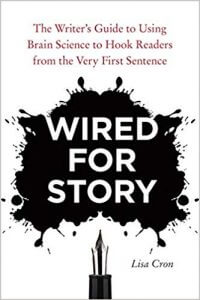
MG: I recently read Wired for Story by Lisa Cron, which you discussed in one of your earlier questions. It is actually a book of brain science that examines how readers behave when they read, how their bodies and minds respond, positively and negatively, to what they are reading. What better way to understand how to write than by understanding how and why people read?
SS: What are common traps for new authors?
MG: Finishing the first draft. So many aspiring authors get stuck in the trap of writing and rewriting certain scenes, or jumping around in their books, without ever finishing a draft of their book. I’m of the belief that you don’t really know what you have to work with until you finish a draft. Stop rewriting, folks! Push through to the end and see what you have. Then, you can start revising.
********************
